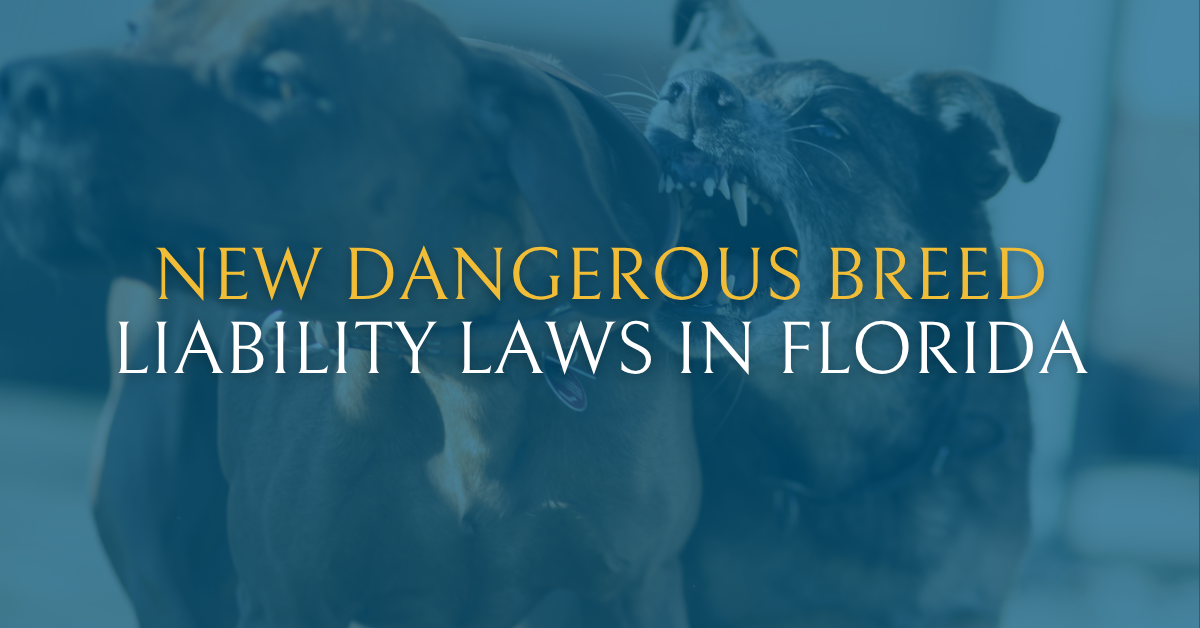At some point, most people have had an experience with an aggressive dog. Whether a dog lunges at you as it walks by on a leash or snarls from behind a fence, you might have been rightfully scared. While not every dog who barks or growls is actually dangerous, there are far too many dogs in Florida who are a menace to other people.
Florida’s new dangerous dog rule seeks to address this issue. Dogs can be deemed dangerous based on aggressive behavior. Once a dog is labelled aggressive, its owner must obtain extra insurance, register the dog, and keep it secured (among other requirements). If you have been attacked by a dangerous dog, you may be able to recover additional compensation with the help of a Vero Beach personal injury attorney.
What Is Florida’s New Dangerous Dog Law?
Florida’s new dangerous dog law, known as the Pam Rock Act, was recently signed into law. This law seeks to address the problem of dangerous, poorly controlled dogs in Florida. It went into effect on July 1, 2025.
The law was named for postal worker Pamela Rock, who was fatally mauled by 5 dogs that escaped from a fenced-in yard in August 2022. Prior to the attack, there had been at least 4 incidents where these same dogs had harmed or threatened people. The dogs’ owner had tried to surrender them to animal control, but no one ever followed up with the man.
This law seeks to address many of the gaps in Florida’s prior laws related to dog attacks. Before this law, the decision about whether a dangerous dog should be removed or euthanized varied from county to county. Owners of dangerous dogs weren’t required to carry liability insurance, and shelters weren’t required to tell potential adopters if a dog had a history of aggression.
The Pam Rock Act sets a statewide standard for dangerous dogs. Its goal is to prevent serious dog attacks, like the one that Pam Rock suffered, and make Florida communities safer.
Under this law, a dog may be classified as dangerous based on its behavior, not on its breed or appearance. A dangerous dog is one that:
- Bites or attacks a person without provocation;
- Causes severe injury to a person (such as broken bones, multiple bites, or any type of injury that requires surgery or stitches);
- Puts a person in fear by menacingly chasing or approaching them in public; or
- Kills or severely injures another domestic animal off of its owner’s property more than once.
Anyone who witnesses or experiences a dog behaving aggressively can file a complaint with the local animal control agency. The agency will then be responsible for investigating the situation. If the investigation confirms that the dog behaved in one of the ways listed above, then it will be declared “dangerous.”
Once a dog is deemed dangerous, there are several new rules that will apply to the owner. First, the owner must obtain at least $100,000 in liability coverage. This is separate and apart from any homeowner’s or renter’s insurance policy that the dog owner may have, which would also cover dog attack injuries.
Second, any dangerous dog must be registered with the local authorities every year. The dog must also be microchipped. These requirements ensure that animal control knows where the dangerous dogs are located in a community and that they can readily identify those dogs. Dangerous dogs must also be spayed or neutered.
Third, dangerous dogs must be kept in a locked, secure enclosure or on a leash at all times. This requirement is particularly important when it comes to reducing dog attacks because it imposes a specific duty on owners to keep their dangerous dogs away from others and safely restrained.
Finally, the Pam Rock Law seeks to close loopholes when it comes to dog adoptions. Shelters are now required to disclose to potential adopters if a dog has a history of aggression prior to adoption. This reduces the likelihood that a family will unknowingly adopt a dog that has previously bitten or attacked other people.
Anyone who fails to follow these rules may be fined up to $1,000. They could also be charged with a criminal offense, and their dog may be taken away or euthanized by the authorities.
Importantly, this law is not about specific breeds of dogs like pit bulls or rottweilers. It applies to ANY dog that may exhibit dangerous and/or aggressive behaviors (beyond typical behavior like barking). A labradoodle could be labeled a dangerous dog under this law, or any other dog that acts in a dangerous, threatening way.
Does The Dangerous Dog Law Change Dog Attack Lawsuits?
In Florida, dog owners are strictly liable for any injuries that their dogs cause. This includes both bites and any other type of attack. Strict liability means that the dog’s owner will be responsible regardless of fault.
There are some narrow defenses to strict liability. Essentially, if the dog attack victim bears some responsibility for provoking or startling the dog, then their recovery could be reduced by the percentage that they were to blame. In addition, if the victim was trespassing or if the owner had warning signs about their dog, then the owner will not be liable for injuries caused by their dog.
The new dangerous dogs law does not fundamentally change the way that dog attack lawsuits work in Florida. There has never been a requirement to prove that a dog was dangerous before recovering for a dog attack. Regardless of whether or not a dog is deemed dangerous, you can still file a claim against the owner for your losses.
However, the law may affect the amount of compensation that a person can recover in a dog attack lawsuit. This is for two reasons. First, the owner is required to carry an extra $100,000 in liability insurance for a dangerous dog. This opens up another potential avenue for recovery for dog bite victims.
Second, punitive damages may be awarded in cases where the at-fault party acted intentionally or recklessly. These damages are meant to punish a wrongdoer, so they are not available in ordinary negligence cases. If a dog has been deemed dangerous and the owner does not take steps to control it and prevent an attack, they may be liable for punitive damages. This can significantly increase a person’s recovery in a dog bite lawsuit.
If you have been injured by a dog in Florida’s Treasure Coast region, we are here to help. Our Vero Beach dog attack lawyers will thoroughly investigate your case and fight to get you maximum compensation for your injuries.
What To Do If a Dog Attacks You?
If you are bitten, knocked down, or otherwise attacked by a dog, your first priority should be getting to safety. Next, seek medical treatment as soon as possible. When you can, report the incident to animal control or local authorities. You should also document everything.
You should then reach out to a Vero Beach dog attack attorney for a free consultation. At Gould Cooksey Fennell, we will help you understand your rights and options when it comes to filing a personal injury claim. Contact us today to set up an appointment with a member of our legal team.
Can You File a Lawsuit Even If the Dog That Attacked Isn’t a Dangerous Dog?
Yes. Florida does not follow the “one-bite” rule, which would require proof of a history of dangerous behavior before you can seek compensation for a dog attack. Even if a dog has absolutely no history of aggression, the owner is still liable for any injuries that it causes.
If you have been hurt by a dog, we can help. Reach out to Gould Cooksey Fennell today for a free consultation with a Vero Beach dog bite lawyer.
Hurt in a Dog Attack? We’re Here to Help.
Dog attacks can be terrifying, causing serious injury and lasting emotional trauma. If you have been injured by a dog, you may be able to file a claim against the owner or another responsible party. Our law offices will help you get financial compensation and some measure of justice for what you experienced.
Gould Cooksey Fennell represents accident victims who have been hurt in all types of accidents, including pedestrian accidents, boat accidents, car accidents, and dog attacks. For each case, our goal is to get our clients the highest possible recovery as quickly as possible. To learn more or to schedule a free initial consultation with a Vero Beach dog bite lawyer, give us a call at 772-758-8595 or fill out our online contact form.





